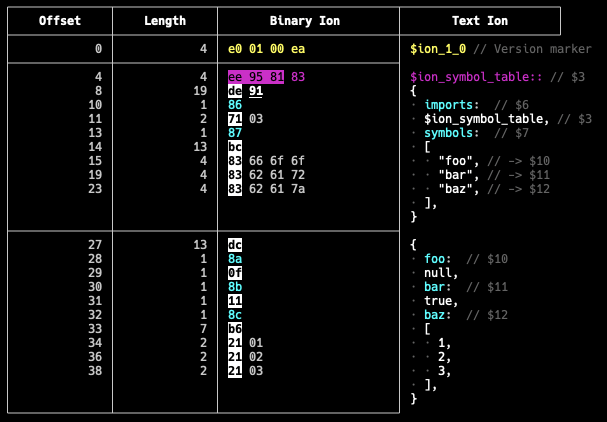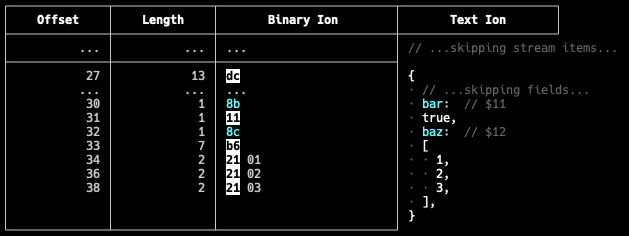15 releases (9 breaking)
| 0.11.0 | Jan 10, 2025 |
|---|---|
| 0.9.1 | Nov 6, 2024 |
| 0.8.0 | Oct 28, 2024 |
| 0.6.0 | Jun 6, 2024 |
| 0.1.1 | Jan 28, 2021 |
#188 in Parser implementations
44 downloads per month
335KB
6.5K
SLoC
Contains (JAR file, 44KB) gradle-wrapper.jar
ion-cli
This repository is home to the ion command line tool, which provides subcommands
for working with the Ion data format.
Table of contents
Examples
These examples use the .ion file extension for text Ion and the .10n file
extension for binary Ion. This is simply a convention; the tool does not
evaluate the file extension.
Unless otherwise noted, these commands can accept any Ion format as input.
Viewing the contents of an Ion file
The ion cat command reads the contents of the specified files (or STDIN) sequentially
and writes their content to STDOUT in the requested Ion format.
ion cat my_file.ion
You can use the --format/-f flag to specify the desired format. The supported formats are:
pretty- Generously spaced, human-friendly text Ion. This is the default.text- Minimally spaced text Ion.lines- Text Ion that places each value on its own line.binary- Binary Ion
Converting between Ion formats
Convert Ion text (or JSON) to Ion binary:
ion cat --format binary my_text_file.ion -o my_binary_file.ion
Convert Ion binary to generously-spaced, human-friendly text:
ion cat --format pretty my_binary_file.ion -o my_text_file.ion
Convert Ion binary to minimally-spaced, compact text:
ion cat --format text my_binary_file.ion -o my_text_file.ion
Converting between Ion and other formats with to and from
The to and from commands can convert Ion to and from other formats.
Currently, JSON is supported.
Convert Ion to JSON:
ion to -X json my_file.10n
Convert JSON to Ion:
ion from -X json my_file.json
Ion Code generation
Code generation is supported with generate subcommand on the CLI.
For more information on how to use code generator,
see Ion code generator user guide.
Analyzing binary Ion file encodings with inspect
The inspect command can display the hex bytes of a binary Ion file alongside
the equivalent text Ion for easier analysis.
# Write some text Ion to a file
echo '{foo: null, bar: true, baz: [1, 2, 3]}' > my_file.ion
# Convert the text Ion to binary Ion
ion cat --format binary my_file.ion > my_file.10n
# Show the binary encoding alongside its equivalent text
ion inspect my_file.10n

The --skip-bytes flag
To skip to a particular offset in the stream, you can use the --skip-bytes flag.
ion inspect --skip-bytes 30 my_file.10n

Notice that the text column adds comments indicating where data has been skipped. Also, if the requested index is nested inside one or more containers, the beginnings of those containers (along with their lengths and offsets) will still be included in the output.
The --limit-bytes flag
You can limit the amount of data that inspect displays by using the --limit-bytes
flag:
ion inspect --skip-bytes 30 --limit-bytes 2 my_file.10n

Schema subcommands
All the subcommand to load or validate schema are under the schema subcommand.
To load a schema:
ion schema -X load --directory <DIRECTORY> --schema <SCHEMA_FILE>
To validate an ion value against a schema type:
ion schema -X validate --directory <DIRECTORY> --schema <SCHEMA_FILE> --input <INPUT_FILE> --type <TYPE>
For more information on how to use the schema subcommands using CLI, run the following command:
ion schema help
Installation
via brew
The easiest way to install the ion-cli is via Homebrew.
Once the brew command is available, run:
brew tap amazon-ion/ion-cli
brew install ion-cli
To install the (potentially unstable) latest changes from the tip of main rather than the latest release, use:
brew install ion-cli --HEAD
via cargo
The ion-cli can also be installed by using Rust's package manager, cargo.
If you don't already have cargo, you can install it by visiting
rustup.rs.
To install ion-cli, run the following command:
cargo install ion-cli
Build instructions
From source
-
Clone the repository:
git clone https://github.com/amzn/ion-cli.git -
Step into the newly created directory:
cd ion-cli -
Install Rust/Cargo by visiting rustup.rs.
-
Build the
iontool:cargo install --path .This will put a copy of the
ionexecutable in~/.cargo/bin. -
Confirm that
~/.cargo/binis on your$PATH.rustupwill probably take care of this for you. -
Confirm that the executable is available by running:
ion help
Using Docker
- Install Docker (see OS specific instructions on the Docker website)
- Clone the repository (recursive clone not necessary)
git clone https://github.com/amzn/ion-cli.git - Step into the newly created directory
cd ion-cli - Build and run the image
# build the image docker build -t <IMAGE_NAME>:<TAG> . # run the CLI binary inside the Docker image docker run -it --rm [optional flags...] <IMAGE_NAME>:<TAG> ion <SUBCOMMAND> # examples: # build docker image with current release version docker build -t ion-cli:0.1.1 . # print the help message docker run -it --rm ion-cli:0.1.1 ion -V # mount current directory to /data volume and cat an ion file docker run -it --rm -v $PWD:/data ion-cli:0.1.1 ion cat /data/test.ion
Security
See CONTRIBUTING for more information.
License
This project is licensed under the Apache-2.0 License.
Dependencies
~25–37MB
~605K SLoC